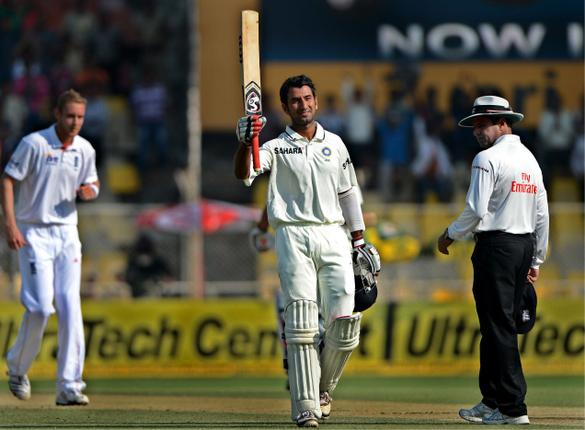
Right-hander hammers classy, unbeaten 206 as India pile up 521/8; visitors struggling at 41/3
conviction that India have found a replacement for Rahul Dravid in Cheteshwar Pujara at number three position.
After all, the Bangalorean belongs to the pantheon of legends and performed consistently for nearly two decades.
In contrast, Pujara is on the budding stages of a Test career that promises a long stint at the top-level and on Friday he offered another hint, scoring a double hundred (206 n.o., 389b, 21x4) against England on the second day of the first Test, leading India to a massive 521 for eight declared.
England were in all sorts of trouble at 41 for three at stumps with spinners R Ashwin, who grabbed his 50th Test wicket in only his ninth Test, and Pragyan Ojha all over them like a bad rash. England are still behind by 480 runs, and they need 281 more to avoid the follow-on.
Cut to Pujara’s effort. The sheer volume of runs that he scored on the day can easily deviate attention from the underlying significance of his knock. Indeed, it requires tremendous amount of stamina and concentration to conjure such an innings, but the knock revealed much more than his endurance.
Resuming from his overnight 98, Pujara took his time to reach the three-figure mark. After playing out a maiden against Graeme Swann, who later went on to claim a five-wicket haul, the Saurashtra man went past the coveted mark, second time in four innings, with a single off James Anderson.
The feat wasn’t celebrated animatedly or by mouthing swear words — a simple wave of the bat and a smile marked the milestone. Subsequent events underscored his desire to carry on and convert the knock into something more substantial, much like his predecessor at number three.
Pujara has always had that burning ambition to score big runs. If you crane your neck back to have a detailed look at his career, you can see some sky scrappers like a triple hundred against Orissa in the Ranji Trophy, two triple tons for Saurashtra in an under-22 tournament, and double hundreds against Maharashtra and the West Indies ‘A’.
However, the England attack is an entirely different beast. Bowlers such as Anderson, Stuart Broad, Swann and Tim Bresnan are tough competitors, demanding higher levels of skills and concentration to score off them.
Pujara proved emphatically that he has both the elements in abundance, and he never let the satisfaction of scoring a hundred hinder his focus. Reaching the landmark seemed to have only liberated him, and his comfort level was quite evident as he stepped out of the crease a few times to Swann, nullifying the turn, however little in amount it was.
Make no mistake; it wasn’t a selfish knock concentrating only on his individual runs. Pujara never left his partners starving for strike. In the company of Yuvraj Singh, who was equally impressive while making 74, Pujara realised 130 runs for the fifth wicket.
The partnership thwarted England’s ambitions for an early breakthrough in the first session. Sensing the touch of Yuvraj, Pujara allowed the Punjab left-hander to dictate terms. As the pair began to impose their game, England bowlers became impatient and their desperation came out in the shape of excessive appealing, and some of them were plain ridiculous.
The burgeoning alliance was snapped when left-arm spinner Samit Patel’s good fortune assisted him to get the wicket of Yuvraj, who lofted a full toss straight into the hands of Swann at long-on. But Pujara was as solid as a rock, and reached his double hundred with a single off Anderson.
This time he allowed himself the liberty of a more vigorous celebration, an extravagant swish of the bat conveying his joy to the adoring home fans. In the process, Pujara also became the sixth Indian batsman to score a double hundred against England, the others being Mansur Ali Khan Pataudi, Sunil Gavaskar, Gundappa Viswa¬nath, Vinod Kambli and Dravid. Not an ordinary company for sure!
Even with such a huge personal landmark beckoning, Pujara never let his focus waver from building partnerships, the latest on the list was a 66-run alliance with R Ashwin for the seventh wicket that propelled India past the 500-mark. It was just the beginning of the Pujara story then, one would reckon.
Score board
India (I Innings, O/n: 323/4):
Gambhir b Swann 45
(127m, 111b, 4x4)
Sehwag b Swann 117
(209m, 117b, 15x4, 1x6)
Pujara (not out) 206
(513m, 389b, 21x4)
Tendulkar c Patel b Swann 13
(25m, 18b, 2x4)
Kohli b Swann 19
(70m, 67b, 3x4)
Yuvraj c Swann b Patel 74
(183m, 151b, 6x4, 2x6)
Dhoni b Swann 5
(39m, 37b)
Ashwin c Prior b Pietersen 23
(81m, 52b, 2x4)
Zaheer c Trott b Anderson 7
(11m, 10b, 1x4)
Ojha (not out) 0
(14m, 9b)
Extras (B-1, LB-10, NB-1) 12
Total (8 wkts decl, 160 overs) 521
Fall of wickets: 1-134 (Gambhir), 2-224 (Sehwag), 3-250 (Tendulkar), 4-283 (Kohli), 5-413 (Yuvraj), 6-444 (Dhoni), 7-510 (Ashwin), 8-519 (Zaheer).
Bowling: Anderson 27-7-75-1, Broad 24-1-97-0 (nb-1), Bresnan 19-2-73-0, Swann 51-8-144-5, Samit Patel 31-3-96-1, Pietersen 8-1-25-1.
ENGLAND (I Innings):
Cook (batting) 22
(72m, 39b, 4x4)
Compton b Ashwin 9
(50m, 53b)
Anderson c Gambhir b Ojha 2
(6m, 6b)
Trott c Pujara b Ashwin 0
(4m, 4b)
Pietersen (batting) 6
(9m, 6b, 1x4)
Extras (LB-2) 2
Total (for 3 wkts, 18 overs) 41
Fall of wickets: 1-26 (Compton), 2-29 (Anderson), 3-30 (Trott). Bowling: Ashwin 8-1-21-2, Zaheer 5-3-6-0, Ojha 4-1-3-1, Yuvraj 1-0-9-0.





Comments
Add new comment